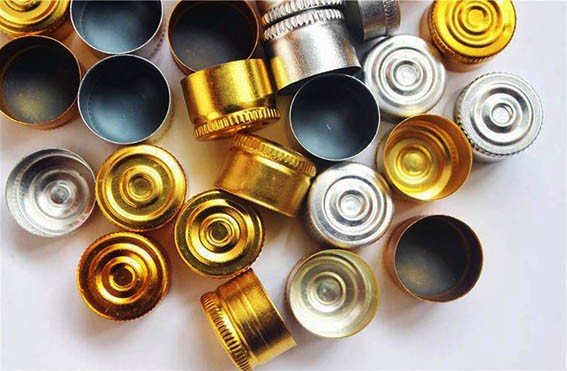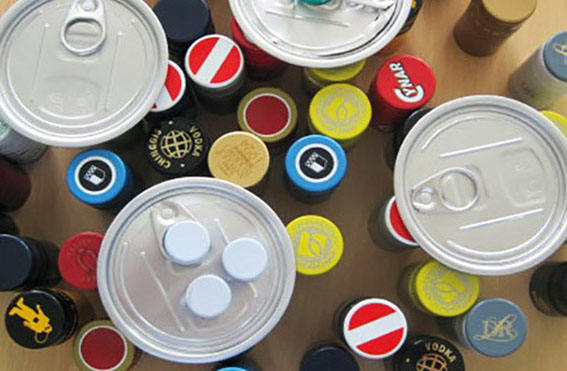8011 1060 Aluminum closure vial
Aluminum closure vials are used to seal small bottles and provide protection and sealing for various products, including pharmaceuticals, chemicals, and laboratory samples.
Materials for Aluminum Closure Vials
Aluminum closure vials are typically made from aluminum alloys such as 8011 or 1060. These alloys are chosen for their corrosion resistance, ductility, and ease of forming into the desired shapes.
1060 Aluminum Strip for Vial Seals
1060 aluminum has excellent ductility and ease of shaping. The strip is anodized to enhance corrosion resistance and durability.
8011 Aluminum Strip for Vial Seals
8011 aluminum offers good corrosion resistance and ductility. The strip is available in H16/H14 temper and is coated with epoxy resin or various colors of paint, including yellow, gold, red, blue, and black.
Advantages of 8011 1060 Aluminum Closure Vials
1. Stable Deep Drawing Quality
Both alloys have excellent deep drawing characteristics, ensuring consistent shape during production and maximizing material use while minimizing waste.
2. Painted or Colored Surface Treatment
Aluminum vial seals can be directly painted or coated in colors. This treatment not only enhances the appearance but also improves functionality and identification, catering to diverse market needs.
3. Durability
Aluminum closures provide robust protection, effectively preventing physical damage and environmental factors (such as moisture, chemicals) from affecting the contents, ensuring safety and quality.
4. Lightweight
The low density of aluminum makes the closures lightweight, reducing transportation costs and making them easier to handle and use, thus improving operational efficiency.
5. Recyclability
Aluminum is highly recyclable, and used closures can be recycled and reused, reducing environmental impact and making aluminum closures an eco-friendly and sustainable choice.
Features of 8011 1060 Aluminum Closure Vials
- Tamper-Evident: Many aluminum closures feature tamper-evident functionality, helping ensure the product has not been opened or altered before use.
- Leak-Proof: Properly designed and manufactured closures ensure tight sealing to prevent leakage and contamination.
- Customizable: Aluminum closures can be customized with various coatings, colors, and embossing to meet branding or functional requirements.
Surface Options for 8011 1060 Aluminum Closure Vials
Varnish Options
- Option 1: Transparent epoxy varnish on both sides of the vial.
- Option 2: Transparent epoxy varnish on one side and colored coating on the other side.
Coating Options
- Double-Sided Coating: 5-6 grams per square meter (g/m²).
- Single-Sided Coating: 2-3 grams per square meter (g/m²).
- Double-Sided Coating: 10-13 grams per square meter (g/m²).
Coating Color Options
Gold/Yellow/White/Red/Black/Blue
Coating Quality of 8011 1060 Aluminum Closure Vials
- Boiling Resistance: No paint peeling or discoloration after 30 minutes at 121°C boiling.
- Acetone and Mercuric Chloride Resistance: No significant peeling after 20 wipes.
Applications of 8011 1060 Aluminum Closure Vials
Aluminum closures for medicine bottles, aluminum tear-off seals, aluminum flip-top bottle seals, pharmaceutical bottle caps, pull-off aluminum caps, injection vial aluminum seals, vaccine bottle caps, pull-tab aluminum caps, medicinal injection vial caps, pull-tab aluminum caps, bottle caps.
- Pharmaceuticals: Used to seal vials containing injectable drugs, vaccines, and other sensitive medications.
- Chemicals: Provides safe protection for chemical reagents and other substances.
- Laboratory Samples: Seals samples for testing and storage, ensuring samples are not contaminated.
Manufacturing Process of 8011 1060 Aluminum Closure Vials
Stamping: Stamping aluminum sheets into the shape of bottle caps.
Forming: Using various processes (such as deep drawing or pressing) to form the stamped parts into their final shape.
Lining: The liner, usually made from rubber or similar materials, is applied to the inner surface of the cap to enhance sealing.
Inspection: Quality control measures are implemented to ensure the caps meet the required specifications and standards.
Aluminum caps are crucial for maintaining the integrity and safety of the sealed contents, making them key components in many industries.






